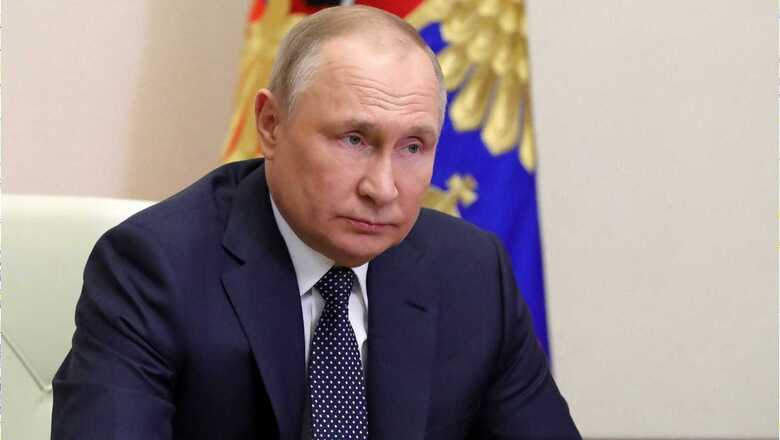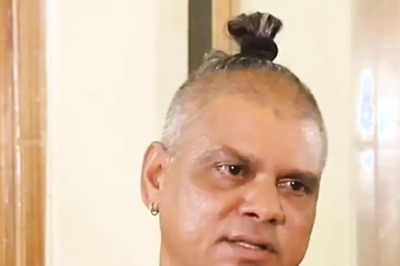
views
The US and its allies like Japan, South Korea, Taiwan and the Netherlands enjoy an elevated status in the global high-tech sphere. Much of the world’s production capacity and intellectual property (IP) related to micro-electronic and semiconductors chips are concentrated in the territory of the US and its allies. This strategic high-tech dominance ensures that the US can inflict major costs on adversarial countries like Russia and China and their economies. It is clear that the recently imposed sanctions and export controls on Russia and the resultant chip starvation will have increasingly detrimental effects on the Russian economy.
Many Russian strategic sectors that require advanced semiconductor chips for operations will noticeably take a hit. The Russian automotive industry, the state space company ROSCOMOS and the domestic communications infrastructure all remain under the threat of stagnation and degradation due to export controls. The latest tech sanctions also have a uniquely devastating bite and unprecedented scope. The sanctions specifically bar any entity in the world that uses American proprietary semiconductor technology from exporting to Russia.
The threat of secondary sanctions on countries or private companies which are not based in the US but use some American IP may trigger a chain reaction of sanctions for anyone who might be willing to supply chips to Russia. Interestingly, Russia’s major ally and chip supplier, China, has state-owned companies like Semiconductor Manufacturing International Corporation (SMIC) that rely on American semiconductor IP to produce their chipsets. If the threat of secondary sanctions will deter China or encourage SMIC to continue or even increase the chip supply to Russia is a yet unanswered question.
Also Read: Despite US Restrictions, it Took China Only 15 Years to Lead the Quantum Computing Race
It would be unfair to say that Russia has no mitigation options at its disposal. In fact, it is expected that Russia would seek alternatives and substitutes. The path to this high-tech substitution however leads from much darker and even grey areas, like parallel imports, smuggling and IP theft. It is important to note that China has a much better rapport with the US and its allies and compared to Russia has been more integrated in the high-tech manufacturing sphere. With companies like SMIC in mainland China supplying as much as 70% of Russia’s semiconductor needs, it would be fair for Russia to reorient even more of its needs to China, as sources from the US & its allies are no longer servicing it.
In light of the sanctions and embargoes, a massive number of companies have either tentatively suspended operations, supplies or outright quit the Russian market. This disruption has prompted Russia to mull legislation and legal measures that enable the country and its domestic industry to continue without foreign entities. Most Russian companies and the government have not resigned to the situation being hopeless, and have instead vowed to find alternatives.
Parallel Imports and Smuggling
The Russian Prime Minister Mikhail Mishustin recently signed a document legalising the parallel import of products into Russia. Parallel imports are internationally thought to be a grey area where the IP holder has no say in the product being imported and in fact results in an iteration of products meant for a different market being supplied to another one. Much of this trade is carried out by resellers and stockpiles, who make deals on the inventory they procure independently. Thus bypassing the Original Equipment Manufacturer(OEM) completely and any restrictions it may be adhering to. While illegal in some jurisdictions and of ambiguous legality in others, nevertheless it’s a genuine shadowy industry worldwide supplying goods to pariah nations like Iran, North Korea and now maybe even Russia. The former Soviet-aligned Eastern Block also had a black market, where high-tech goods and components from the West were smuggled in and were available at exorbitant prices. Today, countries like Georgia which is being accused of helping Russia evade sanctions restrictions and export controls by Ukrainian intelligence and Kazakhstan whose economy is closely tied to Moscow but denies any complacency, may be of use to Moscow.
Also Read: As China Threat Looms over Taiwan, This is How India Can Keep Global Chip Industry Afloat
Alternative Suppliers and Fabricators
Russia is also looking at developing indigenous capacity too, but in the era of complex modern manufacturing, no country can begin from scratch. Domestic import substitution would include finding alternative fabrication facilities for Russian-designed Elbrus and Baikal CPUs, which can theoretically be produced by SMIC instead of Taiwan Semiconductor Manufacturing Company(TSMC), which recently suspended deliveries. As well as sourcing alternate microcontrollers and other chips from countries like India and Brazil, which may be able to provide substitutes that can be adapted for many Russian use-cases.
Is China Really a Dependable Russian Partner
While the US has threatened China and SMIC with being cut off from Western equipment and IP needed for manufacturing semiconductors, the West has not been keen on supplying China with the latest and greatest lithography equipment that can bring it on par with Japan, US and South Korea in semiconductor manufacturing, citing the Wassenaar Arrangement which curtails the export of dual-use technology. ASML, the Dutch company which supplies the latest lithography equipment, has on many occasions been denied permission to supply equipment to Chinese locations even if the facilities there were to be owned and operated by South Korean or Japanese companies. It is fair to say that despite not being cut off yet, China has a considerable interest in shoring up and stockpiling as much of this manufacturing equipment, reverse engineering it & developing derivatives & substitutes as it can. It is thus a good strategy for China to selectively and covertly fulfill orders from Russia without announcing contracts and supplies, thus escaping the heat of evading US-inflicted embargoes on Russia.
Some commentators in Russia believe that the supply of modern lithography and other manufacturing equipment may be obtained through the above-mentioned parallel imports, smuggling and gray operations. However, it would be very difficult for Russia to beat its own ally China which has been keen to buy even obsolete and old semiconductor manufacturing equipment from around the world. Furthermore, China may prefer to keep Russia as dependent on it as possible by denying it any autonomy in this sector for the benefit of larger geostrategic goals.
Aditya Pareek and Arjun Gargeyas are research analysts with the Takshashila Institution. The views expressed in this article are those of the authors and do not represent the stand of this publication.
Read all the Latest Opinion News and Breaking News here


















Comments
0 comment